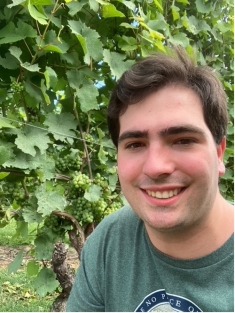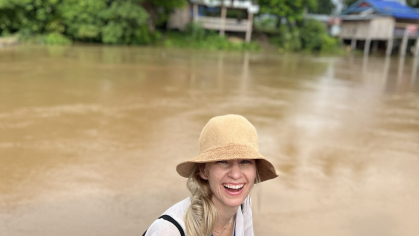Every May, the Administration for Community Living leads Older Americans Month to honor the contributions of older Americans, highlighting aging trends and reinforcing commitments to supporting older adults.
Rutgers School of Public Health is committed to training public health leaders to serve the needs of older adults – the fastest growing segment of the United States population. The school recently developed a fully-online Master of Public Health degree concentration, Population Aging, with scholarship opportunities available to enrolled students. Pursuing the Population Aging concentration improves graduates’ understanding of this population's needs, interventions, and challenges to devise and implement innovative public health and policy solutions that improve health outcomes among the older adult population.

Samuel ‘Sam’ Nemeth, a Master of Public Health student specializing in Population Aging at Rutgers School of Public Health, is currently investigating how prosocial behaviors help increase the chances of recovering from physical and cognitive impairments, and how using an mHealth app, the practice of medicine and public health supported by mobile devices, may improve mental health in older adults.
We spoke with Sam about his passion for population aging and public health, and why this intersection is crucial to recognize during Older Americans Month and beyond.
What inspired you to focus on population aging within public health, and why do you believe it's a crucial area of study?
Population aging could be considered one of the most critical areas of study for public health for everyone (read: we all age!).
My journey into population aging started in the sociology and biological sciences departments at Purdue University through amazing mentorship (shout out to Dr. Patricia Thomas) and introductions to incredible scholars. While I identify sociology as my primary academic home, I became interested in public health for its influence on the lives of older adults. Combining ideas from the two disciplines to study aging has been rewarding and eye-opening. Plus, population aging offers endless avenues for inquiry, which is good as I have many questions I want to help answer!
How does aging tie into other public health concerns?
Older adults face several health and social issues that can significantly impact their well-being and quality of life. For example, the COVID-19 pandemic highlighted the need for social connection for all ages; further, it helped raise awareness of the negative impacts of social isolation for older adults.
Additionally, many older adults will at some point experience at least one chronic condition as well as physical and cognitive impairments. Addressing these issues reaches into areas of public health not focusing specifically on aging such as epidemiology, mental health, policy work, and environmental health to name just a few.
What can public health do to promote healthy aging and improve older Americans' quality of life?
While many may view aging as a negative experience, it doesn’t have to be! Many challenges do exist for older adults, such as declining physical and cognitive health as well as financial insecurity. However, public health is uniquely positioned to help promote healthy aging and improve the quality of life of older adults.
From interventions seeking to help the individual older adult’s mental health through online apps and their ability to age in place through home modifications to larger nationwide policy initiatives helping promote financial security (e.g. social security) and access to healthcare (e.g. the Affordable Care Act), there are many ways public health can benefit the health and lives of not only older adults but people of all ages. Many brilliant scholars are working, both directly and indirectly, to help improve the aging process and the lives of older adults; as such, I firmly believe the future is bright for the health of older adults!


